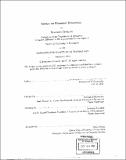Essays on financial economics
Author(s)
Franzoni, Francesco, 1972-
DownloadFull printable version (5.595Mb)
Alternative title
Essays on asset pricing
Other Contributors
Massachusetts Institute of Technology. Dept. of Economics.
Advisor
Sendhil Mullainathan and Jonathan Lewellen.
Terms of use
Metadata
Show full item recordAbstract
The first essay finds that the market betas of value and small stocks have decreased by about 75% in the second half of the twentieth century. The decline in beta can be related to a long-term improvement in economic conditions that made these companies less risky. The failure to account for time-series variation of beta in unconditional CAPM regressions can explain as much as 30% of the value premium. In some samples, about 80% of the value premium can be explained by assuming that investors tied their expectations of the riskiness of these stocks to the high values of beta prevailing in the early years. Moving from these findings, the second essay (co-authored with Tobias Adrian) explores in detail the relation between the 'value premium' and the decrease in value stocks' beta. We develop an equilibrium model of learning on time-varying risk factor loadings. In the model the CAPM holds from investors' ex-ante perspective. However, the econometrician can observe positive mispricing, whenever the expected beta is above the true level. Given the finding of a decreasing beta, it is likely that investors' expectation of the beta of these stocks has been above the actual level. Therefore, our model can provide an explanation for the 'value premium'. We present the results of simulations in which the model accounts for up to 80% of the 'value premium' in the 1963-2000 sample. (cont.) The third essay analyzes the response of stock returns to earnings information. First, I test the assumption that market expectations of earnings reflect a seasonal random walk, despite the actual process being autoregressive. This hypothesis is rejected. Second, I test the opposite view that expectations are unbiased. The data rejects this possibility for small firms. On the other hand, large firms' prices provide evidence of efficiency. Finally, I show that in the case of small firms the market understates the autoregression coefficient in the earnings process, and it incorrectly assumes that this coefficient is positive, even when actual earnings are seasonal random walks.
Description
Thesis (Ph. D.)--Massachusetts Institute of Technology, Dept. of Economics, 2002. Includes bibliographical references.
Date issued
2002Department
Massachusetts Institute of Technology. Department of EconomicsPublisher
Massachusetts Institute of Technology
Keywords
Economics.